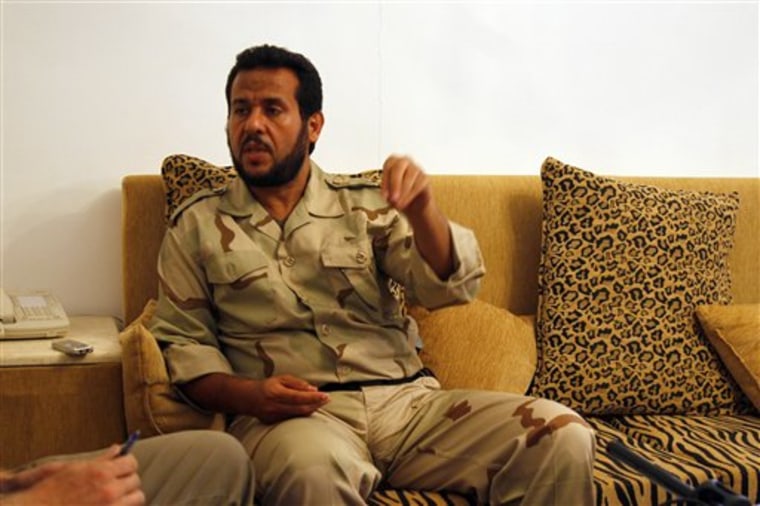A British inquiry into the country's pursuit of terrorism suspects will examine new allegations about cozy ties between U.K. intelligence officials and Moammar Gadhafi's regime, Prime Minister David Cameron said Monday.
Security documents discovered after the fall of Tripoli have offered embarrassing examples of the warm relationships that British and American spies had developed with their Libyan counterparts.
The trove of files document efforts by the CIA and Britain's overseas intelligence agency MI6 in advising Gadhafi's regime on ending its international isolation. In return, the Western agencies won close cooperation as they hunted al-Qaida linked terrorism suspects.
Files discovered among tens of thousands of papers collected from an External Security building in Tripoli show how Abdel-Hakim Belhaj, now Libya's rebel military commander, was targeted for rendition.
Belhaj, who was seized in Bangkok in 2004 and delivered to Tripoli, alleges that U.S. and British intelligence planned his capture and were later involved in his interrogation.
Cameron said a government-commissioned study — known as the Detainee Inquiry — being led by retired appeals court judge Peter Gibson must consider the allegations in its examination of Britain's conduct in the years after the Sept. 11, 2001, attacks on the United States.
The British leader said there were significant accusations "that under the last government relations between the British and Libyan security services became too close, particularly in 2003."
Lawmaker Jack Straw, who was Britain's foreign secretary in 2003, said that his previous Labour Party government opposed torture or mistreatment, but acknowledged that it was "entirely right" that the inquiry examine claims Britain offered inappropriate support to Tripoli.
In one letter uncovered in Tripoli, dated Dec. 24, 2003, a British official thanks Gadhafi's then-spy chief Moussa Koussa for a gift of a "very large quantity of dates and oranges."
Koussa defected from Gadhafi's regime and flew to Britain in March, where he was questioned for several weeks by intelligence officials.
In a public statement in April, Koussa — who also served as Libya's foreign minister — acknowledged he had strong ties with a number of British officials.
"I personally have relations, and good relations, with so many Britons. We worked together against terrorism and we succeeded," said Koussa, who later left Britain for Doha, Qatar.
Cameron said that Gibson's inquiry panel would examine issues around relations with Libya. The inquiry's primary focus is to consider allegations put forward by former Guantanamo Bay detainees who accuse Britain of being complicit in their mistreatment.
"The inquiry has already said it will look at these latest accusations very carefully," Cameron told the House of Commons.
In a statement, the inquiry said it would look "at the extent of the U.K. government's involvement in, or awareness of, improper treatment of detainees — including rendition."
Andrew Tyrie, a British lawmaker who heads a group of legislators investigating so-called extraordinary rendition, said he hoped the British inquiry would get to "the truth about alleged British complicity in the kidnap and torture of detainees."
Cameron confirmed that Mahmoud Jibril, the head of the Libyan rebels' acting Cabinet, has assured Britain that the country's post-Gadhafi regime would assist British police hunting the killer of a policewoman shot dead outside the Libyan embassy in London in 1984.
Since the NATO-led air campaign began in Libya on March 19 British fighter jets have flown 2,400 sorties — about one fifth of the total, Cameron told the House of Commons. He said that the mission would not end until the threat from Gadhafi loyalists had been fully suppressed.
"Those thinking NATO will somehow pull out or pull back must think again. We are ready to extend the NATO mandate for as long as is necessary," he said.
Britain re-established a diplomatic mission in Tripoli Monday, and the U.K. along with its NATO partners will assist Libya's interim government is bringing Gadhafi to justice, Cameron said.
"There must be no bolthole, no pampered hiding place from justice. He must face the consequences of his actions, under international and Libyan law," he told legislators.
Cameron said Britain's top diplomat in Libya and other officials would move from a current base in Benghazi to Tripoli to prepare to reopen the U.K. embassy.
He also repeated calls for Syrian President Bashar Assad to stand down, and to halt violence which the United Nations estimates has seen 2,200 people killed since a crackdown on protests began mid-March.
"The achievement of the Libyan people gives hope to those across the wider region who want a job, a voice and a stake in how their society is run," Cameron said. "The message to President Assad must be clear: he has lost all legitimacy and can no longer claim to lead Syria. The violence must end."
